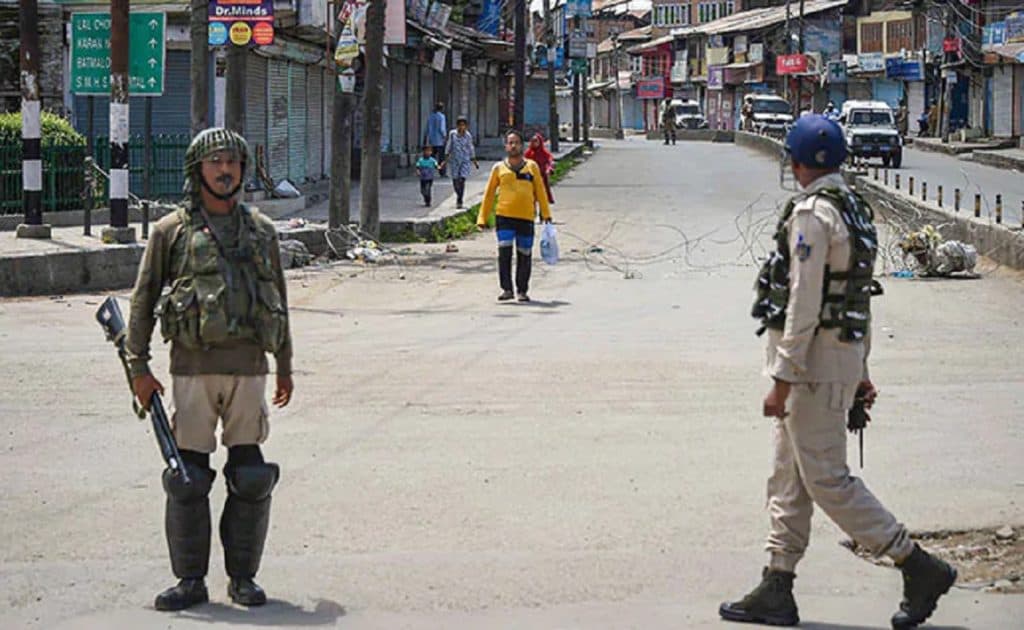By Mehmood Hussain
August 5th is marking the third anniversary of India’s illegitimate action to revoke the special status of occupied Jammu and Kashmir granted under Articles 370 and 35A.

Without going into details what are Article 370 and 35A, because these terms become common among politicians, policymakers, and the public alike. The Pakistani state, Kashmiris in the Pakistan-controlled Kashmir, and around the globe are organizing protests, rallies, seminars, and public debates to denounce the Indian illegal annexation and express solidarity with the people of Jammu and Kashmir. So, we sit together to investigate and analyze where Kashmir stands today and what Pakistan and Kashmiris have done on their part to thwart the Indian state designs to bring demographic change.
Kashmir is the most militarized region and has become a nuclear flashpoint between India and Pakistan, restricting the arch-rivals to restore peaceful relations and regional integration and development. Military and political junta on both sides always use the Kashmir card to win the sympathy of the masses and pursue their narrow personal and institutional interests. For instance, Indian Prime Minister Modi promised Indian nationals to revoke the special status of Kashmir to win sympathy and support. On the other hand, the PTI led government in Pakistan strongly rejected the Indian action in the occupied Kashmir and announced to resist since India reversed its decision. However, nothing has changed over the past years as India has introduced new domicile law and reorganization act in the occupied Kashmir.
Kashmir has become a living hell for the innocent civilians who are living under the prolonged curfew and siege. They are not allowed to move and express their opinion without any fear. Around a million Indian paramilitary troops have unleashed a regime of terror and violence that no one is immune to irrespective of youth, elders, males, females, and children. Global credible organizations such as Amnesty International, Human Rights Watch, and Genocide Watch have raised strong observations about the mistreatment of Kashmiri civilians. Genocide Watch, a United States watchdog has already issued a genocide threat for the occupied Kashmir and urged the international community to take decisive and effective action to stop such crimes against humanity. The Human Rights Watch concluded that India is using excessive force in the region to frighten the local Kashmiris and illegally detaining, extra-judicially executing, torturing civilians, and raping women. To cover up its atrocity crimes and tighten control, India blocked internet access and entry of local and foreign journalists to cover illegal actions.
Since August 5, 2019, two developments are important to discuss here. First, to implement nefarious designs in the occupied region, the Modi government has introduced a new domicile law enabling non-Kashmiris and Hindu pundits to claim the Kashmiri identity. Through this act, India is in the process of systematically transforming the Muslim demography in the region ultimately preparing the ground for an UN-mandated plebiscite in the occupied Kashmir. Modi believes that once India achieves the majority threshold, New Delhi will be in a position to call the UN to implement its long-awaited resolutions and the issue will be settled on the status quo basis because of the Hindu majority. The second part of this systematic and state-sponsored genocide and ethnic cleansing is the reorganization Act of India through which New Delhi has significantly increased the legislative assembly seats of Jammu, a Hindu majority region. Through the reorganization act, India wants to dismantle the Muslim majority in the legislative assembly to make uninterrupted rules to control occupied Kashmir.
India is significantly increasing its major power status through active diplomacy coupled with economic and military strength. Over three years, Modi and his cabinet ministers have paid special visits to the US, European Union, China, Middle East, East Asian nations, and South Asian neighbors to build the Indian narrative and to eliminate the pro-Pakistan and Kashmir sentiments if any. Thanks to the Indian sustained diplomacy and geopolitics of the region, the US refused to listen to the Pakistani viewpoint and further enhanced its defense and strategic partnership. Similarly, the Middle East, EU, and China have economic and geopolitical stakes in India so are siding with New Delhi. Except for the routine condemnation statements, no significant efforts have been made by these international players. China and India are trying to manage the complex relationship so Beijing won’t antagonize India by overtly siding with Pakistan.
Now comes the question of Pakistan’s role. Islamabad is a primary party in the dispute and fought two full-fledged wars and a limited conflict over the dispute. It claims that Kashmir is a jugular vein and it will fight for centuries. But what exactly has it done in the past three years?
At the earliest, Pakistan bluntly refused the illegal annexation of Kashmir and terminated diplomatic relations. The Pakistani government, political parties, and the general public arranged nationwide rallies, protests, seminars, and public talks to highlight the issue. On the UN floor, the then Prime Minister of Pakistan strongly rejected the Indian decision and vowed that Pakistan will resume diplomatic relations with India on the condition of reversal of Article 370 and 35A. The country also tried to build the Kashmir case at the international forums but failed to achieve results. Thanks to Pakistan’s unstable political environment and unsustainable economic structure the world stopped listening to the Pakistani case. Since 2018, Pakistan is witnessing political instability which intensified in March this year a no-confidence motion was moved against Prime Minister Imran Khan consequently ousting him from power. Since April, Islamabad is experiencing the worst political and economic crisis of its history with no near-term solution. The leadership of political parties is trying to safeguard the party interests with total ignorance of the national interest of the country. The military also indulged in this dirty politics with accusations to help the PDM for ousting Khan.
In a nutshell, Pakistan miserably failed to save Kashmir and only tried to save face through organizing rallies, protests, and public debates. It is the dire need of the hour that it should tremendously transform its approach to handling Kashmir, otherwise it will lose its jugular vein.
Author: Mehmood Hussain – Coordinator and Assistant Professor of the Department of International Relations, the University of Azad Jammu and Kashmir Muzaffarabad
(The views expressed in this article belong only to the author and do not necessarily reflect the views of World Geostrategic Insights).







